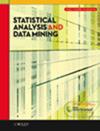eRPCA:指数族分布的稳健主成分分析
IF 2.1
4区 数学
Q3 COMPUTER SCIENCE, ARTIFICIAL INTELLIGENCE
引用次数: 0
摘要
稳健主成分分析(RPCA)是一种广泛使用的方法,用于从被显著和稀疏异常值破坏的数据矩阵中恢复低秩结构。这些破坏可能源于遮挡、恶意篡改或其他异常原因,而这些破坏与低秩背景的联合识别对于流程监控和诊断至关重要。然而,现有的 RPCA 方法及其扩展在很大程度上没有考虑到数据矩阵的基本概率分布,而在许多应用中,数据矩阵的概率分布是已知的,并且可能是高度非高斯分布。因此,我们提出了一种名为 "指数族分布 RPCA"()的新方法,当数据分布属于指数族时,该方法可以将数据分解为低秩稀疏矩阵。我们提出了一种新颖的交替方向乘法优化算法,可在其自然或规范参数化条件下进行高效分解。随后,我们在两个应用中展示了该算法的有效性:第一个应用是钢板缺陷检测,第二个应用是亚特兰大大都会地区的犯罪活动监控。本文章由计算机程序翻译,如有差异,请以英文原文为准。
eRPCA: Robust Principal Component Analysis for Exponential Family Distributions
Robust principal component analysis (RPCA) is a widely used method for recovering low‐rank structure from data matrices corrupted by significant and sparse outliers. These corruptions may arise from occlusions, malicious tampering, or other causes for anomalies, and the joint identification of such corruptions with low‐rank background is critical for process monitoring and diagnosis. However, existing RPCA methods and their extensions largely do not account for the underlying probabilistic distribution for the data matrices, which in many applications are known and can be highly non‐Gaussian. We thus propose a new method called RPCA for exponential family distributions (), which can perform the desired decomposition into low‐rank and sparse matrices when such a distribution falls within the exponential family. We present a novel alternating direction method of multiplier optimization algorithm for efficient decomposition, under either its natural or canonical parametrization. The effectiveness of is then demonstrated in two applications: the first for steel sheet defect detection and the second for crime activity monitoring in the Atlanta metropolitan area.
求助全文
通过发布文献求助,成功后即可免费获取论文全文。
去求助
来源期刊

Statistical Analysis and Data Mining
COMPUTER SCIENCE, ARTIFICIAL INTELLIGENCEC-COMPUTER SCIENCE, INTERDISCIPLINARY APPLICATIONS
CiteScore
3.20
自引率
7.70%
发文量
43
期刊介绍:
Statistical Analysis and Data Mining addresses the broad area of data analysis, including statistical approaches, machine learning, data mining, and applications. Topics include statistical and computational approaches for analyzing massive and complex datasets, novel statistical and/or machine learning methods and theory, and state-of-the-art applications with high impact. Of special interest are articles that describe innovative analytical techniques, and discuss their application to real problems, in such a way that they are accessible and beneficial to domain experts across science, engineering, and commerce.
The focus of the journal is on papers which satisfy one or more of the following criteria:
Solve data analysis problems associated with massive, complex datasets
Develop innovative statistical approaches, machine learning algorithms, or methods integrating ideas across disciplines, e.g., statistics, computer science, electrical engineering, operation research.
Formulate and solve high-impact real-world problems which challenge existing paradigms via new statistical and/or computational models
Provide survey to prominent research topics.
 求助内容:
求助内容: 应助结果提醒方式:
应助结果提醒方式:


